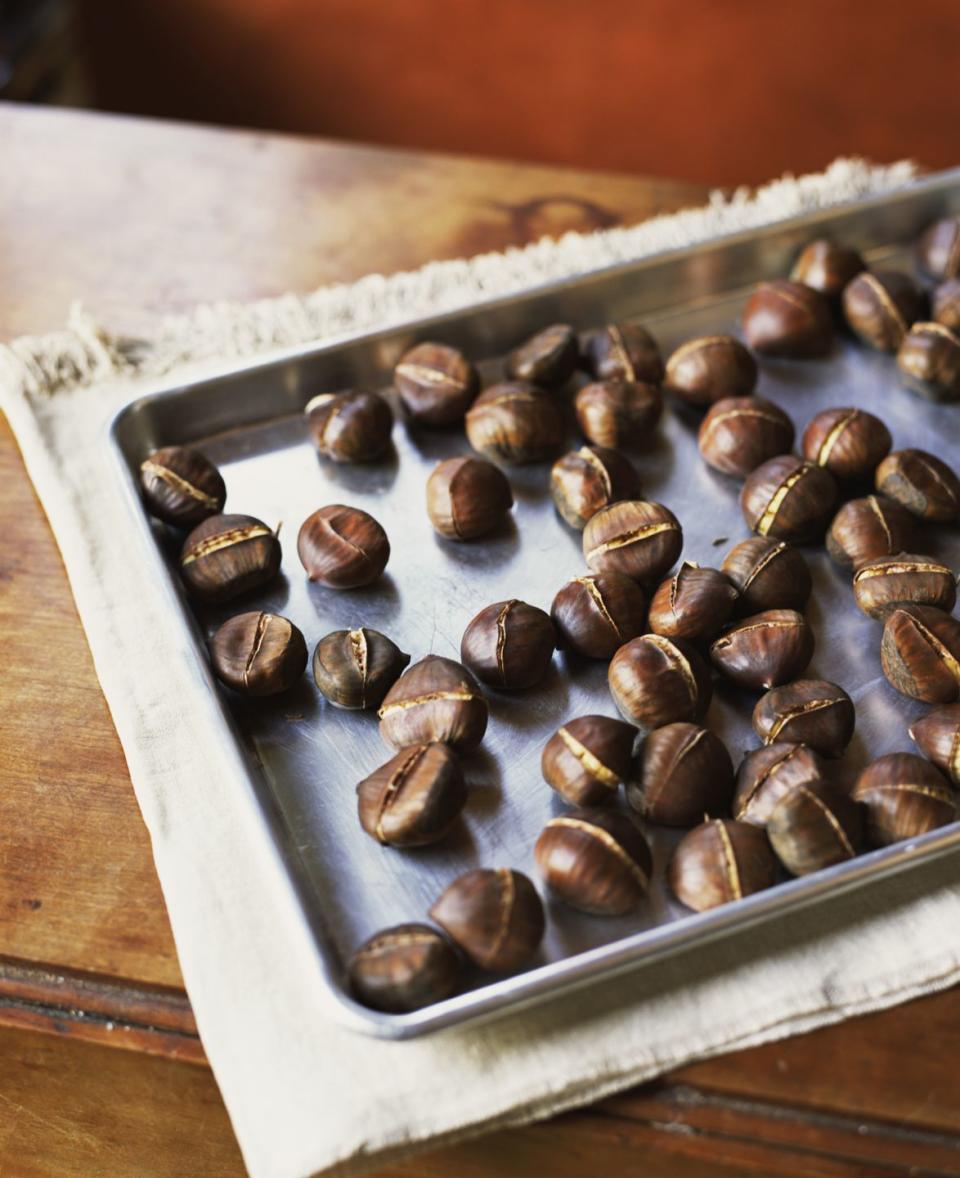Eating Chestnuts Can Help With Digestion. Who Knew?!

Chestnuts roasting on an open fire means one thing: Christmas. It's literally the first line of the "The Christmas Song," but the holiday staple deserves a spot in more than just carols and stuffing. These starchy nuts pack in a surprising dose of fiber, vitamin C, and important minerals like copper and potassium. Here's exactly what's inside those tough hulls.
Nutrition Facts
Serving Size: 1 ounce, roasted
70 calories
0.6 g total fat
15 g carbohydrates
1.4 g dietary fiber (5%)
3 g sugar
0.9 g protein
vitamin C 12% DV
vitamin B-6 5% DV
copper 7% DV
manganese 17% DV
potassium 4% DV
magnesium 2% DV
Health Benefits of Chestnuts
Unlike most other nuts, chestnuts contain little protein or fat and chiefly provide complex carbs. That doesn't mean they skimp on essential nutrients: Chestnuts supply vitamins and minerals that benefit your body from head to toe.
The fiber improves digestion.
Just 10 roasted chestnuts include 17% of what you need for the day - a major plus considering most of us don't get nearly enough. Americans eat on average about 16 grams of fiber per day, half of the recommended amount of 25 to 30 grams. Fiber in plant-based foods like nuts can help maintain GI health, lower LDL (or "bad") cholesterol levels, and contribute toward a healthy weight by filling you up, according to the Mayo Clinic.
The complex carbs will you keep you energized longer.
While almonds and peanuts pack in the protein, chestnuts predominantly contain complex carbohydrates, which your body digests slowly for a stable energy source. Foods high in fiber and complex carbs also have a less immediate effect on blood sugar, reducing potential spikes, the Harvard T.H. Chan School of Public Health Nutrition Source states.

The vitamin C contributes to healthy tissues.
While it's more famous for boosting your immune system, vitamin C actually supports the formation of blood vessels, cartilage, muscle, and collagen throughout your body. The antioxidant also protects your cells against the damaging effects of free radicals and aids in the absorption and storage of iron.
Copper helps form red blood cells.
Like vitamin C, this trace mineral supports the health of your blood vessels, nerves, immune system, and bones and assists in iron absorption, according to the U.S. National Library of Medicine. About 10 roasted chestnuts supply 21% of the recommended daily amount.
How to Eat Them
"While they’re lower in fat and protein compared to other tree nuts and legumes, chestnuts make for an easy-to-use ingredient that's also nutritious and, despite their association with the whole 'holiday feast' season, actually relatively low in calories," says Jaclyn London, MS, RD, CDN, Nutrition Director at the Good Housekeeping Institute. "They’re great for grinding into flour; using as a swap for croutons in salads; topping soups, stews, and stir frys; or eating as a snack in their own right."
To get the best benefits, skip the sweetened chestnut purees or syrup-filled jars and choose pre-cooked kinds without added ingredients. Or buy 'em fresh and try roasting or boiling the nuts yourself. (FYI: Water chestnuts and horse chestnuts are different things altogether.)
Besides the traditional salads, stuffings, and soups, chestnuts pair well with pretty much all of your favorite fall and winter flavors, including apples, cabbage, Brussels sprouts, turkey, pork, sage, thyme, and mushroom.
('You Might Also Like',)


